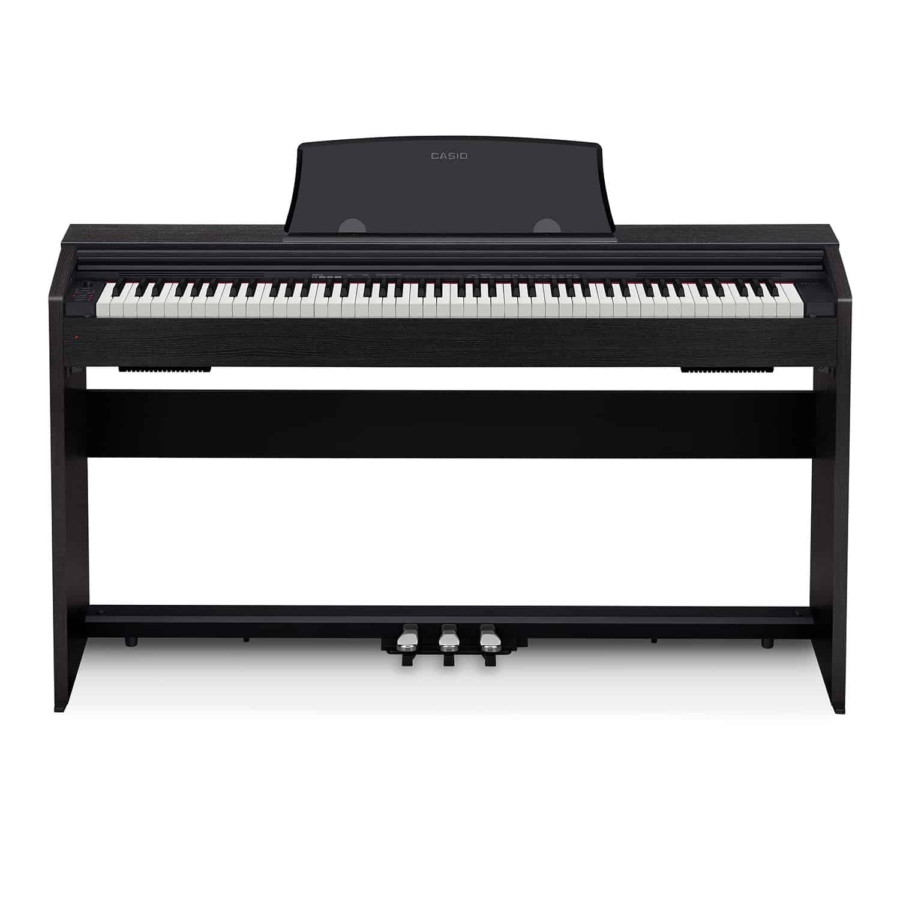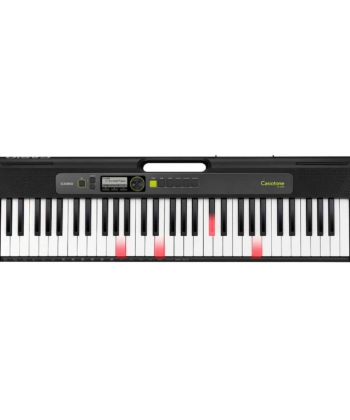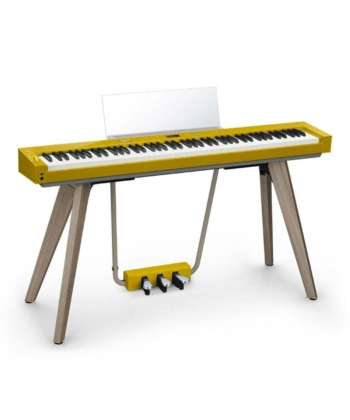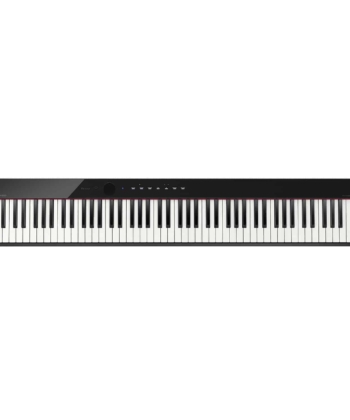Description
Product Overview
While Casio has successfully broken into the high-end digital piano market as a viable competitor to the big three of Kawai, Roland, and Yamaha, Casio’s main area of focus over their 4 decades of manufacturing digital pianos and keyboards has been the entry-level and intermediate parts of the market. Casio digital pianos are widely equated in the industry with hard-to-beat value. The Casio Privia PX-770 keeps this reputation alive and is a totally viable option along with brands like Roland and Yamaha.
Casio’s portable Privia models have been hugely popular over the last few years with beginners and even gigging professionals. The PX770 delivers the Privia experience in a compact cabinet built for the home, and checks all the boxes you’ll need for students learning piano, hobbyists looking for creative expression, and higher-level players who require the versatility of a digital piano for practicing. Casio’s exclusive AiR Sound Source (Acoustic and intelligent Resonator) generates a highly realistic grand piano sound, along with 19 total onboard sounds, including various grand pianos, vintage electric pianos synths, and harpsichord.
With Casio’s Tri-sensor II Scaled Hammer Action Keyboard, you’ve got a reliable action, a compact modern design with a matching bench, and a variety of useful features. A home piano that competes well in its class.
Action
The PX-770 digital piano is outfitted with Casio’s Tri-Sensor 88-note scaled hammer action keyboard II. This is an action with a natural feel, if giving off a little bit more key noise than the latest actions from Roland or Kawai. For many, this won’t matter one bit but is notable if action is your number one priority. There are three adjustable levels of touch sensitivity which is a nice feature, and it’s scaled very well across the entire range of the instrument.
There are simulated ebony and ivory key tops to help with grip, especially the ivory textures. Some might feel that this action is on the heavier side, but we would argue that it’s actually the dynamic resistance that is bulkier than normal – the actual amount of weight required by your finger to make the key move (static resistance) feels completely in line with an acoustic piano action.
Piano Sound
The PX-770 boasts an excellent acoustic piano tone, which it owes to Casio’s Multi-Dimensional Morphing AiR (Acoustic and intelligent Resonator) tone generator. This engine is sample-based (4 velocity layer), plus the additional synthesis of parameters like damper resonance and hammer response.
The PX-770 features a polyphony of 128 notes which will be fine for most general piano playing, and in general delivers a very solid piano sound, especially when used with headphones to overcome the limitations of the onboard speaker system and stereo amplification system, and while still sufficient for home use at 16 watts of power, playing the PX770 with headphones reveals more complexities of the sound engine.
The onboard instrument tones cap out at a respectable 19, and that includes organs, pads electric pianos, and harpsichord among others. There’s also a duet mode that splits the keyboard down the middle into two equal ranges so two people can play at once (particularly useful for piano lessons.)
Connectivity
The PX770 doesn’t offer a ton of connectivity, but the basics are covered with USB to host (to connect via wire to a Mac or Windows device) as well as two 1/4″ headphone inputs. Since this is a home digital piano meant for practicing and learning piano, the connectivity options you’d find in an instrument built for the stage aren’t present here.
Despite the lack of Bluetooth, the PX770 is still compatible with Casio’s Chordana Play app. You can access the app by connecting a USB cable to your iOS or Android device.
Notable Features
The Concert Play add-on found in the PX-770 is an impressive feature that should is sure to provide inspiration and some excitement with young learners. This feature allows the user to play orchestral pieces along with a full symphony orchestra!
- AiR Sound Source tone engine
- 19 onboard sounds
- 128 note polyphony
- 16 watts of speaker power
- Acoustic Simulator Parameters for Piano Tones: Hammer Response, Damper Resonance, Damper Noise
- 88 note Scaled Hammer Action Keyboard II
- Duet mode, Transpose (-12 semitones ~ 0 ~ +12 semitones)
- Digital Effects: Hall Simulator / Reverb – 4 (Reverb), Chorus – 4, Brilliance – (-3 ~ 0 ~ 3), DSP – (Preset for some tones)
- On-board lesson function
- Music Library: 60 songs
- On-board USB Audio Recorder: Two track MIDI recorder
- Built-in 3-pedal unit with soft, sostenuto, and damper pedals
- Metronome
- AC power supply, music stand, and built-in key cover included
Conclusions
If your focus is piano tone and an instrument built specifically for home use, the Casio PX770 is one of the top options for the price point.
Casio PX-770 Owner’s Manual
- [English] PX-770 Owner’s Manual
Casio PX-770 Related Resources
- Casio Privia PX-770 Review & Demo – Affordable Home Piano
- Casio Privia PX-870 vs PX-770 Digital Piano Review & Demo – Tri-Sensor II Scaled Hammer Action
Specs
| Keyboard | 88 keys, Tri-sensor Scaled Hammer Action Keyboard Ⅱ, Simulated ebony and ivory keys, 3 sensitivity levels, |
| Tones | Sound Source : Multi-dimensional Morphing AiR Polyphony (maximum) : 128 Number of Built-in Tones : 19 |
| Simulator | Hammer Response, Damper Resonance, Damper Noise – (ON / OFF) |
| Digital Effects | Hall Simulator / Reverb – 4 (Reverb), Chorus – 4, Brilliance – (-3 ~ 0 ~ 3), DSP – (Preset for some tones) |
| Songs | Concert Play – 10 songs, Controller – Start / Stop, Mode – Listen / Lesson / Play, Music Library – 60 Songs, Song Expansion (User Songs) – 10 songs (max.) Up to approximately 90 KB / song |
| Additional Features | Connection to app, Lesson Function – Part ON / OFF, Lesson Part Select – Right hand, Left hand, MIDI Recorder – 2 tracks, 1 song, Approximate Data Capacity – Approximately 5,000 notes total, Duet Mode, Octave Shift – ±2 octaves, Metronome – 0 to 9 beats; tempo range : 20 to 255, Pedals – 3 built-in pedals (damper, soft, sostenuto) |
| Key Transpose | 2 octaves (-12 semitones ~ 0 ~ +12 semitones) |
| Tuning Control | A4 = 415.5 Hz ~ 440.0 Hz ~ 465.9 Hz |
| Number of Preset Temperaments | 17 |
| Others | ・GRAND PIANO 1 button ・ELEC PIANO button ・Slide-type keyboard cover ・Auto Power Off: Off after approx. 4 idle hours (default setting) |
| Connectivity and Storage | PHONES/OUTPUT, Connector for 3-Pedal Unit, USB TO HOST |
| Speakers Size | 4.72″ x 2 |
| Speakers System | 2-Speaker |
| Amplifiers | 8 W + 8 W |
| Dimensions | 54.76″ x 11.77″ x 31.42″ |
| Weight | 69.45 lbs |
| Included Accessories | AC Adaptor, Music Stand |
Additional Information
| Weight | 84 lbs |
|---|---|
| Dimensions | 60 × 16 × 16 in |







Reviews
There are no reviews yet.